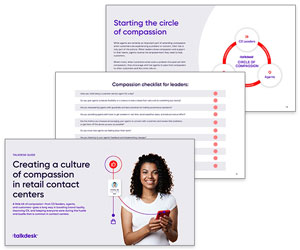What can call centre managers do to improve agent empathy skills?
“The capacity to know emotionally what another is experiencing from within the frame of reference of that other person, the capacity to sample the feelings of another or to put oneself in another’s shoes.”(1)
In other words, an empathetic response meets four conditions:
1. An awareness of the state of being of another
2. An understanding of the condition
3. A personal identification with the situation
4. An appropriate, affective response.
Put simply, it is the ability of one individual to understand another by placing themselves hypothetically in their position. It has become commonplace to say that call centre agents don’t exhibit empathy on a consistent basis with customers, and recent studies clearly support this.
In a recent study by Aspect Software, polled UK customers rated satisfaction with call centre agent empathy skills at 63%, poor on its own, and even worse taking into account that this represents a 7% drop in satisfaction from the previous year. In that same report, of those UK customers who reported having an exceptional experience, empathy was rated at 88%
(2). Undoubtedly, demonstrating strong empathy skills, in addition to providing the customer with the information/service they require, plays a key role in ensuring customer satisfaction.
It is clear that agents must demonstrate empathy with customers to ensure customer satisfaction, but the reality is that agents often do not. Why is this? Several factors are involved, not least of which is the lack of effective training, monitoring and coaching.
Why aren’t current processes working?
The primary culprit is the initial communication training that agents go through. Too often this training is an information download, or, especially in the case of a soft skill such as empathy, an oversimplified eLearning module which provides no opportunity for:
• Analysis of successful and unsuccessful calls and the role of empathy therein
• Practice of key skills in context
Agents are fed a set of standard phrases to use with customers, but more often than not, these are statements of sympathy, not empathy, and come across to customers as condescending and insincere.
Beyond the initial training programmes, coaches and team leaders (TLs) do not exhibit the skill set to identify weaknesses in empathy or give appropriate and effective remediation. Coaches and TLs are not recognising the role and importance of empathy in the success of a call.
What can call centre managers do to help improve agents’ empathy skills?
Empathy is an important skill in order to communicate effectively, build relationships and build trust with your customers. The ability to empathise and win the trust of your customer is essential to winning new customers, retaining your customers and handling complaints.
Implementing the following training techniques will help to develop an agent’s empathy skills:
1. Role plays
Role playing games in a learning environment can be a very flexible and effective tool, helping to build teams, develop employee motivation and improve communication skills.
Plan your role plays and be mindful of the following objectives and guidelines:
• Be clear and concise when communicating your objective – what do you want people to learn from this experience?
• All sides of the role play should be unambiguous and aligned to the objectives set out
• The brief should contain enough information for the delegate to engage in a believable conversation
• Paint the picture – explain the background of the characters; why is this role player angry, what has made him angry?
• Give the role players adequate preparation time
• Allow the observers time to provide feedback after the exercise
• Make sure time is set aside to discuss what worked, what didn’t work and what could have been done better within the exercise
2. Training exercises
Ensure that specific training exercises are available for agents and focus on the following areas:
• Helping to build rapport – Identify rapport-establishing phrases, questions, and then role-play to demonstrate. Role players must be aware of their tone and whether it is suitable.
• Introduce specific empathetic questions – Identify suitable empathic questions in order to gather the information required – what questions need to be answered in order to help, how to ask for this information and in what tone.
3. Introduce an empathic buddy system
The main benefit of implementing a buddy system, whereby an agent pairs up with another agent, is that they are given the opportunity to receive honest feedback from one another. Agents can not only praise one another when a call has gone well but they can also learn from each other by working together as a team to identify areas of improvement.
The content and delivery of these training programmes and exercises will be dependent upon the specifics of your process.
However, the principles behind them should remain constant:
• Informative – explain the cultural differences in empathy, importance in customer service, and demonstrate real figures showing the negative (and positive) impact of empathy and lack thereof.
• Analytical – must make use of authentic calls, both positive and negative examples, to show agents what’s going wrong and how to do things right.
• Skill-based – provide opportunity for agents to practise, and be marked on that practice against a standard call monitoring rubric.
What will be the result?
In our experience of working with call centres in many countries, an immediate positive impact on customer satisfaction (CSAT) scores is achievable with the implementation of the above solutions. Agents, coaches and TLs will perform at a much higher level of proficiency, and the new emphasis on empathy during initial training will ensure that incoming agents will maintain and improve upon gains in CSAT.
(1) D. M. Berger (1987). Clinical Empathy. Northvale: Jason Aronson, Inc.
(2) CRM Today, 28 September 2007
_____________________________________________________
 Declan Mulkeen is the marketing director at culture and communication skills consultancy, Communicaid
Declan Mulkeen is the marketing director at culture and communication skills consultancy, Communicaid
Tel: +44 20 7648 2140
Author: Jonty Pearce
Published On: 11th Feb 2008 - Last modified: 19th Sep 2019
Read more about - Skills, Angry Customers, Empathy, Language, Soft Skills





































Very nice and very useful.Its a great learning aspects.
Highlight some of the effective empathy statements. This will be more helpful to know what kind of sentence we can put across to the customers.
hi,
that is very informative
thank you so much
Very helpful and informative, thanks
this is very informative and helpful. maybe the author can make a more in-depth study about the subject.
Bravo, great post.
Training so often focuses on the systems, the procedures, the processes and not on the things that the customer “judge” their experience by.
The role play is where we see learning accelerate and good briefs, see participants learning as much when they play the caller as when they practice being the agent.
We’ve also got to bear in mind, that many businesses become entrenched in their world, and their systems. “The computer says no”
Running training sessions which help people focus on what it’s like to be a customer with that organisation really helps connect agents and callers, and that connection is also crucual in employee engagement.
this is very helpful and effective!
Thank you so much!
These tips are really helpful.I came to know a lot of useful things from this post.Thanks a lot for sharing. Keep blogging. Looking forward to reading your next post.
I am glad this website was made.
It will stregthen our dispatched call center staff.
Thank you.
This is great! LOVE IT! As a Quality Assurance Coordinator for a major health care system in Philadelhpia, PA, USA, I’m always looking for ways to communicate to the agents the importance of good customer service and empathy. I look forward to more readings like this.
Excellent
Thank you.
It is possible to resolve an issue and yet leave the Customer with the feeling that the experience was frustrating and unpleasant…
thankyou! big help for us
i would like to see some phrases pls.
this is some good stuff. The article above make you realize how truly important it is to empathize someone else’s feelings. Please give us some good sample statements that we may share to our agents.
It’s really helpful. Thank you very much.
How we do empathize to an angry customer? Please help!
i agree with this and this is the reason why i have high satisfaction
It very very helpful information in order to help customers and form the best solution for support.